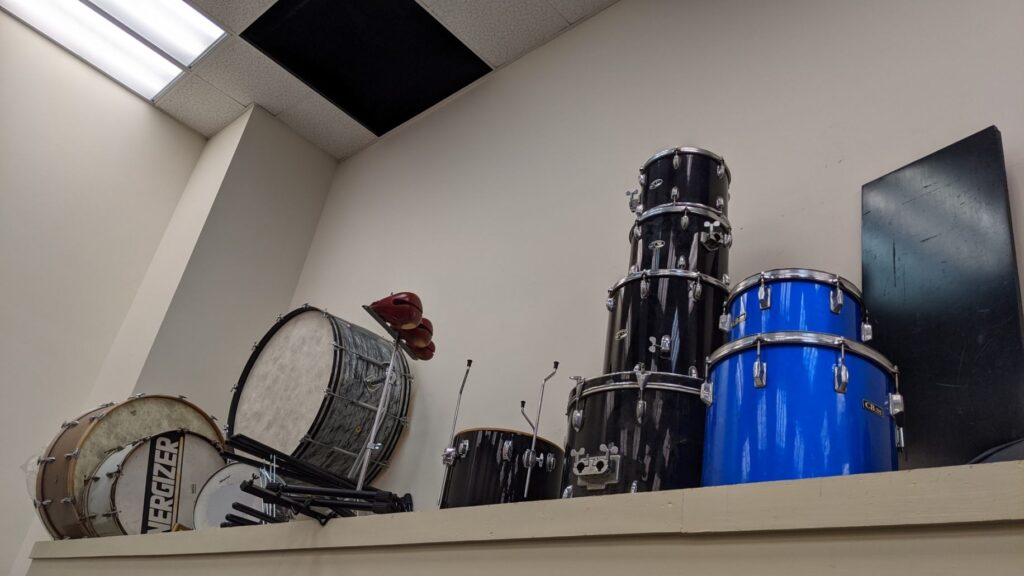Department of Music denied mask exemption, results in participation and rehearsal issues
4 min read
Some in the department believe that mask mandates are limiting participation in ensembles. | Jenny Thompson / The Blue & Gray Press
GRANT CRAGG
Staff Writer
Some students and professors in the Department of Music are frustrated by the indoor mask mandates after being denied an exception for rehearsing and performing. They say the pandemic and COVID regulations have decreased the number of people participating in ensembles.
“Our ensembles are subject to the same restrictions as everyone on campus, including wearing masks while indoors,” said Dr. Chris Ryder, director of choral activities. “While this is a great improvement over our situation a year ago, it restricts our music-making ability quite a bit. Since voices and many of our musical instruments require the transmission of air through our mouths, masks present significant obstacles in that process.”
Currently, the music department is following the UMW’s general campus rules and regulations.
“We had hoped to get an exception to the mandate for very specific lesson, rehearsal and performance contexts, but the institution’s commitment to the health and safety of the community prevailed—and while I’m thankful for that commitment, it is disheartening to see how compromised the musical experience has to be,” said Dr. Brooks Kuykendall, the music department chair.
Matthew Case, adjunct professor of percussion and music technology, said that the limitations and restrictions make it nearly impossible for students to participate.
“Basically [ensemble] is done,” he said. “If you’re a wind player, you basically can’t play. Last semester it was distancing that made it difficult. As an ensemble you expect to be shoulder to shoulder and that’s not necessarily negative, but it’s different.”
Although there have been changes implemented compared to how they practiced and performed last year, the music ensembles at the University of Mary Washington are experiencing many struggles due to COVID-19 rules and regulations. Last year, ensembles were not allowed to perform for an audience indoor or outdoor. Everything for music ensembles was done remotely. All performances had to be pre-recorded individually by students.
“These recordings were then compiled and arranged into ‘ensemble’ presentations,” said Kuykendall. “While the end product bears a resemblance to a musical ensemble, the experience is not the same at all, since students had no actual, simultaneous performance alongside other musicians.”
“We’re in a better position than we were last year,” said Kuykendall. “We hope to have live audiences [for] at least some of the concerts, and we are able to rehearse and perform outdoors without masks. And this year community musicians (who have often participated in our ensembles) will be allowed to return upon proof of vaccination.”
The Department of Music has adapted to these restrictions in various ways.
“We have been able to make the best of these difficult circumstances with a combination of procedures that include singing with masks and playing instruments with masks and covers specifically designed for that purpose,” said Ryder. “We have also taken opportunities when possible to rehearse outdoors, where masks are not required.”
Although UMW ensembles and the Department of Music are able to hold live performances, they are experiencing difficulties trying to find the best way to attract audiences.
“We are also limited in our ability to perform to live audiences, which will result in smaller audiences that have to be screened in a similar way to those already in the UMW community, or outdoor performances. Both of these options present less-than-ideal situations, but they do allow us to hold public performances,” said Ryder.
The UMW COVID-19 Implementation Team has not created exceptions for students in music ensembles who are vaccinated or additional precautions for students that are not fully vaccinated, as they have for student athletes and other extracurricular activities on campus.
Hailey Amick, a junior music major and member of the chamber choir and jazz band, shared her frustration about the lack of accommodations for the music department.
“I feel like people who are in charge of events and extracurricular activities at UMW do not care about the music department and don’t want to put their efforts in,” she said.
Students who sing or play an instrument that requires the use of their mouth have been cleared to use playing masks, but they were not made aware of this in time for the start of the fall semester.
Playing masks are “masks with openings to allow someone to play a wind instrument—but we didn’t find this out until after the beginning of the term. We ordered these masks right away, but we’re still waiting for them to arrive, so we’ve lost a lot of valuable rehearsal time,” said Kuykendall.
During this time, some ensembles are experiencing less participation than in past years.
“Right now we are smaller because not as many people feel that they can even take the course,” said Amick. “Mainly it’s just the music majors or minors that are participating in it right now, and previously it was an assortment of people, even people that were not minoring in music.”
For all students majoring in music, being in a music ensemble group is required to graduate. Some students are feeling discouraged that they will not be able to have the performances they need to graduate.
“This is my career that we are holding [on the line], this is my major and is literally something I’m doing with the rest of my life,” said Amick. “I want to go on and go to [graduate] school. Am I going to be able to go to [graduate] school if I haven’t had the performance opportunities they are supposed to give me?”



